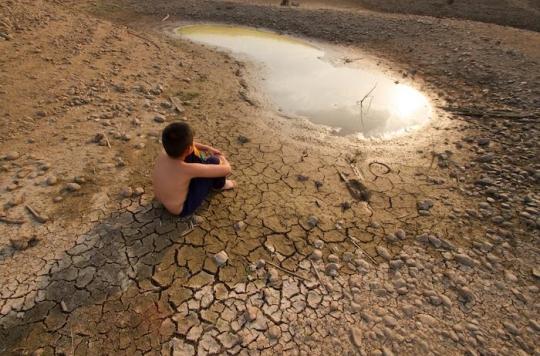Global warming not only impacts our physical health with soil, air and water contamination, but also affects our psychological balance. The lights are red, we are all concerned.

Glaciers are melting, ecosystems are dying out, biodiversity is weakening and natural disasters are intensifying. If you didn’t know it already, it’s urgent. Every day, the Earth’s resources are dwindling, temperatures are rising and with them the deterioration of human health. While global warming has a serious impact on factors that determine our physical health, such as soil, air and water, and its consequences for health care systems are significant since it promotes the resurgence of infections, increases social inequalities and weakens already vulnerable populations, it also has a considerable impact on our mental health.
250 million climate refugees by 2050
In particular via “the frequency and intensity of natural disasters” (fires, storms, tornadoes, hurricanes, floods, etc.) which can generate trauma, stress, depression and emotional upheaval in affected populations. The disappearance of their loved ones, their homes, their workplaces and food outlets, combined with their migration to other places, seriously affects their psychological balance. The Promiscuity between climate refugees and their precariousness can also increase human-to-human transmissions of diseases, or even between humans and animals.
The lack of clean water promotes hygiene problems, but also drought and famine. The destruction of crops and the inaccessibility of roads make the delivery of supplies and medicine difficult. As well as the lack of human resources and humanitarian aid during the first hours, even the first days following the disaster. The speakers of the colloquium “Climate change: what health consequences?” organized by Esther Benbassa, senator EELV of Paris and David Belliard, President of the environmental group of Paris, on October 12 in the Senate, are clear on the subject: “natural disasters will occur more and more regularly” and intensify, because the Earth is hurting. And its climatic crises affect the physical and mental well-being of humans.
In their report – requested by the United Nations Framework Convention on Climate Change (UNFCCC) – which is to be used for discussions at COP24 which will begin on December 3 in Katowice, Poland, Al Gore and IPCC experts also provide for a increase in stress-related pathologies. Already in 2011, four scientists estimated in the scientific journal Nature that as it stands, there will be 250 million climate refugees by 2050 and that population displacements due to rising sea levels and the destruction of housing and hospitals are believed to be the cause of many mental disorders.
Hurricane Katrina associated with 4% increase in mental disorders
This alarming observation is in line with that of researchers from the MIT Media Lab, the Bedford Affairs Medical Center and the Laureate Institute for Brain Research, who have recently studied the state of mental health of two million Americans between 2002 and 2012 and compared this data with weather information collected over the same period. “We find that moving from monthly temperatures between 25°C and 30°C to over 30°C increases the likelihood of developing mental disorders by 0.5%, and that one degree Celsius of warming over 5 years is associated with a 2% increase in the frequency of mental health problems”.
Global warming therefore not only impacts our physical health. “Exposure to Hurricane Katrina was associated with a 4% increase in this score,” the researchers note. “Exogenous increases in monthly temperature and additional precipitation days amplify the likelihood of having mental health problems within a month.”
To a lesser extent, scorching heat waves also cause mood disorders, intense fatigue, a lack of concentration, discernment and motivation. Rising temperatures can impact the quality of sleep and therefore (snowball effect obliges), well-being at work, productivity, the quality of social relations or even physical fitness. Global warming therefore not only impacts animal species or wildlife and forests, but also humans, their well-being and their health.
“Everything will be decided in the next 10 years”
However, out of 180 countries that have ratified the Paris Agreement, only 9 have taken action. “Pollution is the greatest threat from this rise in temperatures and is the cause of around 7 million deaths, at an estimated cost of between 0.9 and 1.8 billion euros,” it was reported. declared in the Senate.
To heal the planet, Dr. Jean-François Toussaint, Professor of Physiology and Director of the Institute for Biomedical Research and Sports Epidemiology (IRMES) estimated that 80% of fossil fuels would have to be given up. Yves Richard, Professor of Geography at the Climatology Research Center has recommended the planting of hundreds of trees to cool large cities, whose materials retain heat. “It’s very simple, but plants are the best bulwark against the heat”. Why not offer to educate the children? “Because it will be too late, everything will be decided in the next 10 years, it’s up to us to act now”.

.















